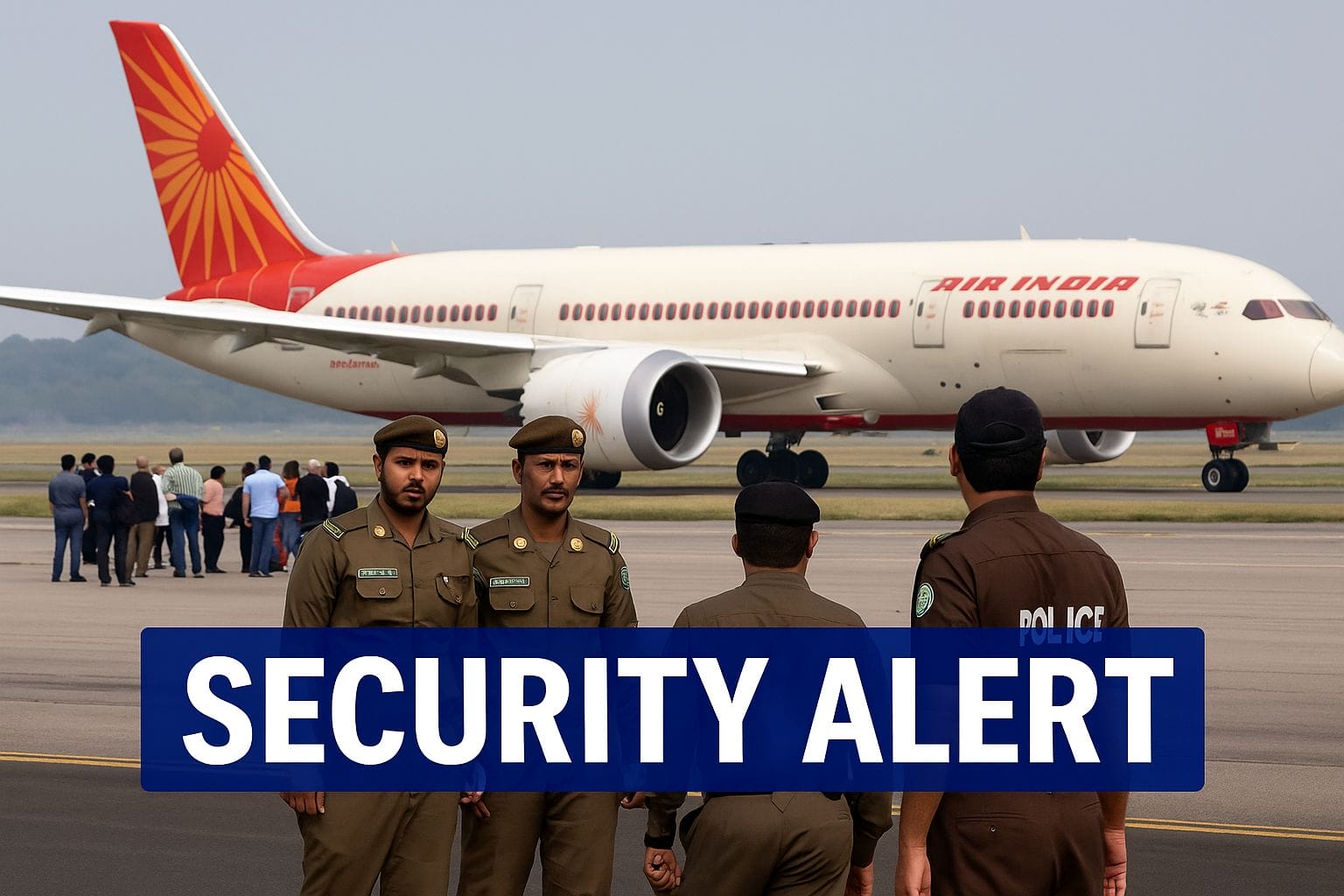In a critical mid-air security development, an Air India flight operating between Birmingham, United Kingdom and Delhi, India was diverted to Riyadh, Saudi Arabia on June 21, 2025, following a credible bomb threat. The flight, carrying numerous international travelers, executed an emergency landing at King Khalid International Airport (RUH), prompting swift and coordinated action from Saudi authorities and Air India personnel.
This high-alert scenario disrupted travel plans, sparked widespread passenger concern, and reignited dialogue around the importance of robust aviation security protocols amid global instability.
In-Flight Threat Forces Swift Reroute
Flight AI116, a scheduled Boeing 787 Dreamliner service from Birmingham to Delhi, was mid-journey when Air India operations received intelligence indicating a potential onboard threat. Acting under international aviation safety regulations, the airline issued an immediate security alert and instructed pilots to divert the aircraft to the nearest safe airport equipped to handle high-security emergencies.
Riyadh’s King Khalid International Airport was chosen as the emergency diversion site, where local authorities activated full-scale security and emergency response procedures upon arrival. The aircraft landed safely without incident, and passengers were evacuated in an orderly manner under heightened security surveillance.
Emergency Measures Activated at Riyadh Airport
Saudi airport and aviation security officials responded rapidly by securing the aircraft, isolating passengers and crew, and deploying bomb detection and disposal units. According to preliminary reports, a full search of the cabin and cargo hold was conducted, involving canine units and specialized bomb squads.
No explosive device was found on board, but the security threat was treated with utmost seriousness. The aircraft remained grounded for several hours as investigators verified the integrity of passenger items, aircraft systems, and background communications.
Passenger Confusion and Stress Highlight Communication Gaps
Passengers onboard reported experiencing significant distress due to limited communication in the early moments of the diversion. Many were unaware of the exact nature of the threat until after the aircraft landed, fueling anxiety and speculation among travelers.
Several passengers expressed frustration over unclear timelines, lack of in-flight updates, and uncertainty about rebooking options. The situation drew attention to the critical importance of transparent and real-time communication from airlines during emergencies, particularly during international operations where language and cultural differences may also come into play.
International Cooperation Showcased in Crisis Management
Aviation experts praised the swift coordination between Air India and Saudi authorities in ensuring passenger safety. The seamless collaboration between airline command centers, Riyadh’s airport security, and international aviation bodies demonstrated a textbook example of multinational response capabilities in high-risk scenarios.
In a joint briefing, officials from both Air India and Saudi aviation security emphasized the importance of continued cooperation and intelligence sharing between nations in mitigating threats to global aviation.
Operational Impacts and Brand Management Challenges for Air India
While the immediate crisis was resolved without physical harm, the incident poses reputational challenges for Air India. The airline must now focus on restoring traveler confidence, especially among its international clientele, many of whom rely on the carrier for long-haul travel between Europe, the Middle East, and Asia.
Industry analysts note that Air India will likely face scrutiny over its in-flight communication standards, emergency support systems, and passenger service protocols. It will be essential for the airline to transparently review and publicize its crisis-handling procedures to reinforce trust among consumers.
Wider Implications for Aviation Security
This incident is a stark reminder of the persistent threats facing global air travel. With rising geopolitical tension and evolving terrorism tactics, commercial carriers remain vulnerable to security threats that can disrupt international flight operations and endanger passenger welfare.
Aviation analysts advocate for stronger threat-detection technologies, expanded inter-airline intelligence networks, and recurrent crew training for crisis management. “There is no room for complacency,” remarked one senior aviation security advisor. “What this case shows is that vigilance, coordination, and communication are our strongest tools.”
Passenger Advice and Travel Readiness
Travelers are encouraged to stay informed about airline safety policies and subscribe to flight tracking or alert services offered by their carriers. Knowing the basics of in-flight emergency protocols and ensuring access to verified information sources during disruptions can help reduce panic and confusion.
Experts also recommend purchasing comprehensive travel insurance, especially for international trips involving multiple regions, to help offset unexpected disruptions or accommodation expenses during diversions.
Air India’s Next Steps and Public Messaging
Air India has issued a preliminary statement confirming the safe landing and the absence of any explosives on board. The airline assured passengers that investigations are underway to determine the origin of the threat and reaffirmed its commitment to passenger safety.
A detailed report is expected within the coming days, with Air India pledging to improve its communication strategy and customer service during emergency incidents.
Conclusion: A Wake-Up Call for Aviation Industry Resilience
The emergency diversion of Air India’s Birmingham–Delhi flight is a powerful reminder of the fragility and complexity of global aviation. It underscores the importance of resilient systems, international cooperation, and, most importantly, putting passenger safety above all else.
As Air India works to regain momentum, the airline—and the industry at large—must use this incident as a learning opportunity to bolster preparedness, trust, and transparency across all touchpoints of the passenger journey.
For more travel news like this, keep reading Global Travel Wire
















